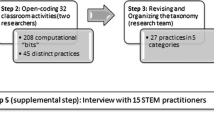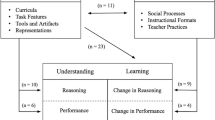Abstract
Throughout the ages writers have been concerned with contemporary problems. Their reflection became part of their literary works. By tracing and interpretating mathematical references in literature information can be obtained: on the attitude towards mathematics, on its prestige in society, its cultural recognition and its significance for education. This article analyses the implication of mathematics in some exemplary novels, essays and theoretical writings on literature of authors from the 17th to the 20th century.
Similar content being viewed by others
Literatur
Andreae, Johann Valentin: Christianopolis. Reclam jun.: Stuttgart: 1975.
Descartes, René; Regeln zur Ausrichtung der Erkenntniskraft Meiner: Hamburg 1979.
Döblin, Alfred: Schriften zu Leben und Werk. Walter: Olten und Freiburg/Br. 1986.
v. Dülmen, Richard: Die Utopie einer christlichen Gesellschaft. Johann Valentin Andreae (1586–1654). Teil 1; fromann-holzboog: Stuttgart-Bad Canstatt 1978.
Goethe, Johann Wolfgang: Sämtliche Werke Bd. 20. I. Briefwechsel mit Zelter. Text 1799–1827. Hanser, München 1991.
Goethe, Johann Wolfgang: Sämtliche Werke Bd. 17. Wilhelm Meisters Wanderjahre. Maximen und Reflexionen. Hanser, München 1991a.
Goethe, Johann Wolfgang: Sämtliche Werke Bd. 13.2. Die Jahre 1820–1826; Hanser, München 1993.
Goethe, Johann Wolfgang: Napoleonische Ziet. Briefe, Tagebücher und Gespräche. II. Abt. Band 6. Napoleonische Zeit. Briefe, Tagebücher und Gespräche vom 10. Mai 1805 bis 6. Juni 1816. Teil I: Von Schillers Tod bis 1811. Deutscher Klassiker Verlag: Frankfurt Main 1993a.
Gottsched, Johann Christoph. Schriften zur Literatur. Reclam jun.: Stuttgart 1972.
Grillparzer, Franz: Sämtliche Werke. Historisch-kritische Gesamtausgabe Bd. I. 10. Gedichte Erster Teil. Schroll & Co: Wien 1932.
Hesse, Hermann: Unterm Rad. Suhrkamp: Frankfurt/M. 1982.
Keller, Gottfried: Sämtliche Werke und ausgewählte Briefe, Erster Band. Hanser: München 1978.
v. Kues, Nikolaus: Die belehrte Unwissenheit Buch II. Meiner: Hamburg 1967.
Meier, Georg Friedrich: Beurtheilung der Gottschedischen Dichtkunst. Olms: Hildesheim-New York 1976.
Meier, Georg Friedrich: Anfangsgründe aller schönen Wissenschaften. Erster Theil. Olms: Hildesheim-New York 1976.
Musil, Robert: Tagebücher: Rowohlt: Reinbek 1976.
Musil, Robert: Gesammelte Werke Band II Prosa und Stücke, Kleine Prosa, Aphorismen, Autobiographisches, Essays und-Reden, Kritik. Rowohlt: Reinbek 1978.
Musil, Robert: Der Mann ohne Eigenschaften. Rowohlt: Reinbek 1978a.
Musil, Robert: Briefe 1901–1942. Rowohlt: Reinbek 1981.
Platon: Sämtliche Werke Bd. 1–6. Rowohlt: Reinbek 1957ff.
Strauß, Emil: Freund Hein. Eine Lebensgeschichte. Schweier: Kirchheim/Teck 1982.
Wolff, Christian: Anfangsgründe aller mathematischen Wissenschaften 1. Olms: Hildesheim-New York 1973.
Wolff, Christian: Übrige theils noch gefundene kleine Schriften und Einzelne Betrachtungen zur Verbesserung der Wissenschaften. Halle 1755.
Author information
Authors and Affiliations
Rights and permissions
About this article
Cite this article
Radbruch, K. Literatur als Medium einer Kulturgeschichte der Mathematik. NTM N.S. 3, 201–226 (1995). https://doi.org/10.1007/BF02913714
Issue Date:
DOI: https://doi.org/10.1007/BF02913714




